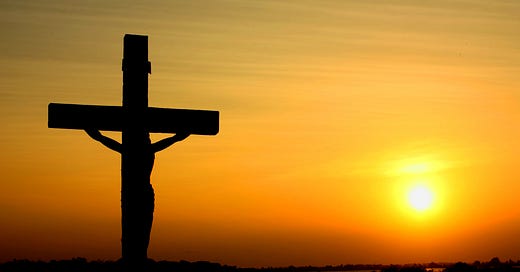St. Augustine said, in reference to the Hebrew and Christian scriptures: “The new is in the old concealed; the old is in the new revealed.” Today is one of those days where the parallels are explicit.
Reading 1
Nm 21:4-9
From Mount Hor the children of Israel set out on the Red Sea road, to bypass the land of Edom. But with their patience worn out by the journey, the people complained against God and Moses, "Why have you brought us up from Egypt to die in this desert, where there is no food or water? We are disgusted with this wretched food!"
In punishment the LORD sent among the people saraph serpents, which bit the people so that many of them died. Then the people came to Moses and said, "We have sinned in complaining against the LORD and you. Pray the LORD to take the serpents away from us."
So Moses prayed for the people, and the LORD said to Moses, "Make a saraph and mount it on a pole, and whoever looks at it after being bitten will live." Moses accordingly made a bronze serpent and mounted it on a pole, and whenever anyone who had been bitten by a serpent looked at the bronze serpent, he lived.
The people complained, and were punished for it. When they repented, God gave them a cure.
But the cure isn’t a pill or spray. It’s a reminder of what they did! They look to the snake, and are prompted to contemplate why they were in this predicament in the first place.
Responsorial Psalm
Ps 78:1bc-2, 34-35, 36-37, 38
R. (see 7b) Do not forget the works of the Lord!
Hearken, my people, to my teaching;
incline your ears to the words of my mouth.
I will open my mouth in a parable,
I will utter mysteries from of old.
R. Do not forget the works of the Lord!
While he slew them they sought him
and inquired after God again,
Remembering that God was their rock
and the Most High God, their redeemer.
R. Do not forget the works of the Lord!
But they flattered him with their mouths
and lied to him with their tongues,
Though their hearts were not steadfast toward him,
nor were they faithful to his covenant.
R. Do not forget the works of the Lord!
But he, being merciful, forgave their sin
and destroyed them not;
Often he turned back his anger
and let none of his wrath be roused.
R. Do not forget the works of the Lord!
It’s easy to see Jesus prefigured in this Psalm, as He taught in parables and referenced the scriptures in His preaching. His own followers were not steadfast, and the people of His time executed Him.
This was the beginning of the most important event in human history. Jesus forgave His executioners, He forgave us, and then redeemed us on Easter Sunday. We cannot forget!
Reading II
Phil 2:6-11
Brothers and sisters: Christ Jesus, though he was in the form of God, did not regard equality with God something to be grasped. Rather, he emptied himself, taking the form of a slave, coming in human likeness; and found human in appearance, he humbled himself, becoming obedient to death, even death on a cross.
Because of this, God greatly exalted him and bestowed on him the name that is above every name, that at the name of Jesus every knee should bend, of those in heaven and on earth and under the earth, and every tongue confess that Jesus Christ is Lord, to the glory of God the Father.
This appearance to be an early Christian hymn. Remember that most people weren’t literate, so they’d only know what Paul’s letter said if the local rabbi (later, priest) read it to them. But give them a song to sing and a rhythm to dance to, they’ll remember it forever.
So, Paul is re-affirming some of the earliest Christian theology, trying to drill it into his followers’ minds. Jesus is Lord, but he came to serve us, to save us.
“Do you know the Apostles’ Creed?”
“No, but maybe if you hum a few bars…”
Alleluia
R. Alleluia, alleluia.
We adore you, O Christ, and we bless you,
because by your Cross you have redeemed the world.
R. Alleluia, alleluia.
Jesus’ death on the cross is one of the most difficult tenets of the faith to grasp. As we read in Paul’s First Letter to the Corinthians a few weeks ago, it’s “a stumbling block to Jews and foolishness to Gentiles.” That’s why the Church reminds us of the cross on this feast day.
Gospel
Jn 3:13-17
Jesus said to Nicodemus: “No one has gone up to heaven except the one who has come down from heaven, the Son of Man. And just as Moses lifted up the serpent in the desert, so must the Son of Man be lifted up, so that everyone who believes in him may have eternal life.”
For God so loved the world that he gave his only Son, so that everyone who believes in him might not perish but might have eternal life. For God did not send his Son into the world to condemn the world, but that the world might be saved through him.
Moses’ serpent was a reminder of the people’s sins and the cure for their ills. Jesus tells Nicodemus (an honest Pharisee) that the same will be true of Him. Of course, we know Jesus means His death on the cross.
Non-Catholics often ask why we use a crucifix instead of a bare cross, and this reminder is the reason. Jesus died for all our sins, past, present, and future. He did this willingly, and we can never forget it.



